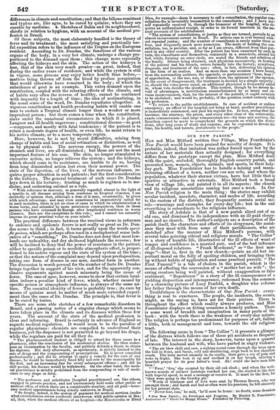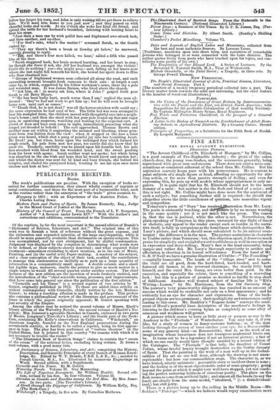OUR NEW PARISH..
HAD not Miss Mitford written Our Village, Miss Fourdrinier's New Parish would have been praised for novelty of design. It is probable' indeed, that imitation was rather forced. upon her by the nature of her materials than actually designed ; for everything differs from the prototype except the plan. Miss Mitford dealt with the quiet, secluded, thoroughly English country parish, and presented men, women, objects, animals, and sports, in their holy- day garb. Miss Fourdrinier has to. handle a mining and manu- facturing offshoot of a town, neither rue nor urbs, and where the population, whatever their sterner virtues, have but little that is sportive or attractive in externals. Miss Mitford took a broad view of village life, and painted it in all its aspects; the church and its religious associations coming but once a week. In Our New Parish religion is the main thing : the stories may exhibit secular incident, anecdote, character, and modes of life, according to the custom of the district; they frequently contain social mo- rals—warnings and examples for every-day life ; but in the end everything is subordinate to the religious influence. The story of Ashdale is that of a new parish sliced out of an old one, and dismissed to its independence with an ill-paid clergy- man and no church. The author's subjects are a description of the parish itself, the characters and efforts of its clergymen, the assist- ance they meet with from some of their parishioners, who are sketched after the manner of Miss Mitford's persons, with several tales pointing ethical and religious morals. "The Collier" is a story of humble life, illustrative of the ill effects of want of temper and confidence in a married pair, and of the bad influence of ill-disposed relations. "Frank Mordeunt," or "the first mar- riage "—that is, first in the new church—points an old but im- portant moral on the folly of spoiling children and bringing them np without habits of application and some practical pursuit. "The First Funeral" is a tale of cholera in the parish, which is the means of effecting the conversion of a "mother but no wife "; the erring creature being well painted, without exaggeration or false sentiment. "Repentance ', is a story of the ill consequences of a yielding disposition and intemperance, redeemed from the common by a charming picture of Lucy Penfold, a daughter who reforms her father through the means of her own death. Truthfulness is the characteristic of Our New Parish : every- thing is real to exactness. The people, the incidents, the scenes, might, as the saying is, have sat for their picture. There is throughout the effect which reality always produces, and Miss Foardrinier displays on fitting occasions a homely pathos. There is some want of breadth and imagination in many parts of the book : with the truth there is the weakness of every-day nature. The religion is perhaps too predominant for purposes of art, falling a little, both in management and tone, towards the old religious tract.
The following scene is from "The Collier ": it presents a glimpse of the distress which follows one of those pit accidents so frequent of late. The interest in the story, however, turns upon a quarrel between the husband and wife, who have parted in angry violence.
"The air blew chill and raw, a sighing sound came through the trees upon the hill in front, and Sarah, cold and shuddering, crept back to her cheerless couch. The baby moved uneasily in its cradle, then gave a cry of pans and woke in fright. She took it up and soothed it on her breast, uttering a heartfelt prayer for its poor father's weal. Ah! could she have seen him then ! "'Four,' five,' she counted by their old oak clock ; and when the well- known sounds of colliers' footsteps reached her ear, she started to the door with hopeful speed, to send a message or receive it. It must be the first, for they were going to the Cowdry pit.
"Words of kindness and of love were sent by Thomas Brown, who was amongst them' and harsh and bad as often were his passions, he felt sincerely for her present state.
" 'Never fear, lass,' he said, 'he'll soon be home : no doubt, some drunken
• Our New Parish; its Privileges and Progress. By Harriet E. Fourdrinier, Authoress of " Hints for Happy Hours." Published by Pickering.
fellow has forgot his turn, and John is only waiting till we get there to relieve him. We'll send him home to you just now ' ; and they passed on with cheerful looks and words. At six o'clock she woke her kind old friend, and spread the table for her husband's breakfast„ listening with beating heart to hear his steps. "Just then a man ran by with pallid face and frightened awe-struck look, and then another, and another. "For God's sake, what's the matter? ' screamed Sarah, as the fourth rushed by.
"They say there's been a break at Cowdry pit below,' he answered, scarcely pausing to reply. YOB, and there's four men killed, we hear,' added a fifth who passed him at the door.
"Sarah staggered back, her brain seemed bursting, and her heart to atop; for though she knew it not, she felt her husband was amongst the victims ! Could she do nothing ? yes—she might pray—and, falling on her knees near where she last night fell beneath his blow, she bowed her spirit down to Him who thus chastised her.
"Groups of frightened women soon collected all along the road, and each succeeding moment brought fresh rumours to their ears: at length a cart came by, in which, supported by his fellow workmen's arms, there lay a pale and wounded man. It was James Barnes, who lived above the church.
" Ask him, oh ! in mercy ask him, where is John ?' gasped forth poor Sarah to old Betty Bloore. "He has been badly hurt, much worse than I am,' replied the man ad- dressed: 'they've had sad work to get him up ; but he will soon be brought home now, next cart as comes.'
"Thank God, he is not dead !' was all the horror-stricken wife could say ; the same expression he had used of her. The little bed was soon arranged to bear his mangled form, the children moved with thoughtful care into a neigh- bour's house ; and then she stood with her poor pale bound-up face and eager eyes, in agonizing suspense, watching and waiting for the expected cart. A crowd of men and boys soon came in sight, immediately preceding what she longed yet dreaded to behold ! The cart approached. Thomas Brown and smother man sat within it supporting the maimed and bleeding, whose pros- trate form was hidden from the view : when it stopped at the door a faint groan was heard, which shot a pang of painful joy into her trembling heart. He lived ! yes, but when, borne upon the unhinged door which formed his rough couch, his pale form met her gaze, too surely did she know that he must die. Tenderly, carefully was he placed upon his humble bed, his pale face streaked with blood from his wounded head, and the sweat pouring from his brow with agony. Sarah neither wept nor spoke; her whole being was absorbed in the one wish and hope that he would know and pardon her ; and whilst the doctor was sent for by kind and busy friends, she bathed his temples, and chafed his uninjured hand, trusting to see his eyes once more unclose and look at her."



























 Previous page
Previous page